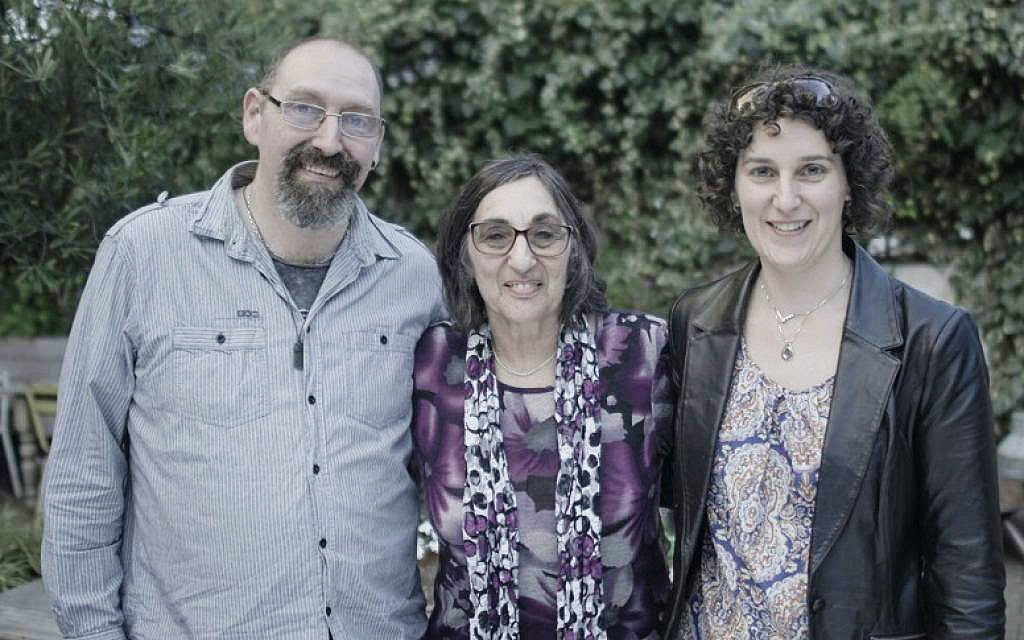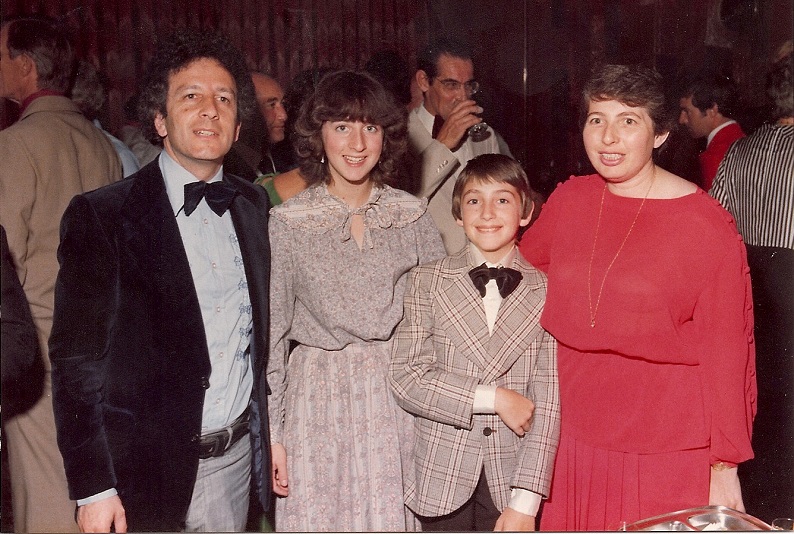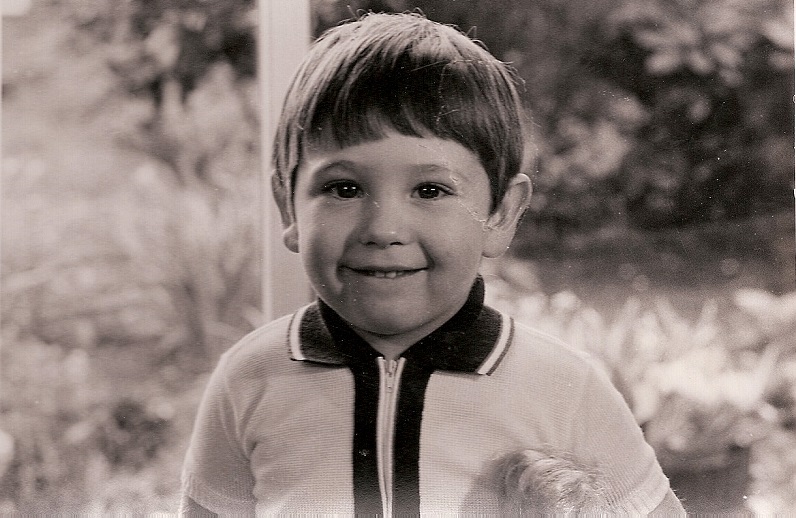Long Lost Family sees emotional mother and son reunion after 50 years
Davina McCall and Nicky Campbell help Marc Wolfe trace his birth mother, Esther, in the emotional ITV series

He was the much-loved, adopted child of a close-knit Jewish family and now has children and grandchildren of his own.
But rarely did a day pass that Marc Wolfe didn’t think about the circumstances that led him to being handed over as a new-born baby to a new family.
“Deep down I always wondered why I was given up,” he confesses. “Was it because my mother didn’t want me? I’ve had that doubt every day of my life. I have to find out why she gave me up.”
Get The Jewish News Daily Edition by email and never miss our top stories Free Sign Up
Marc’s emotional journey to trace his birth mother is documented in ITV’s Long Lost Family, hosted by Davina McCall and Nicky Campbell, and airing on Tuesday at 9pm.
The 49-year-old from Surrey begins by visiting the home he grew up in with adopted parents Ruth and Terry, and older sister Benita.
He recalls his childhood with fondness, that the family “used to go to synagogue together every Saturday” and that “being Jewish gave me a sense of belonging, which is important to someone who is adopted.”
But at the age of 16, Marc suffered the emotional trauma of losing his adoptive mother to leukaemia.
“Losing mum was very, very difficult for me,” he says. “She was a very big part of her life and having her gone, I felt totally lost. In my grief, I did feel that I had lost two mothers.”
He began questioning where he had come from and for the first time wanted to find out more about his birth mother.
Having ordered his birth certificate, Marc discovered her name was Esther Joan Howard and was only 19 at the time. His father was not named, leading Marc to conclude that they were unmarried.
His adoptive parents also told him that she had gone to “great efforts” in finding a Jewish family to place him with.
“That means the world to me, it really does,” reflects Marc. “But if she did care, why did she give me up? I need to know.”
Researching through records, the team discover that Esther went on to marry in Oxford, in 1972. Further searches under her married name draw a blank, but a copy of her father’s will reveals that she had migrated to Auckland, New Zealand in 1972.
Host Nicky makes the journey to meet her at her home in the city’s North Shore, where she lives with her husband and two grown up children.
Giving a heart-breaking account of events, Esther reveals that she had never wanted to give up her son, but without the support of her family felt she had no other options. She had told her husband about Marc before they married, but Esther had only recently told her children about their half-brother.

She says: “I definitely thought about it, but I didn’t know where to start. It’s so difficult giving a child up. To get on with your life, you just have to block it out.
“I was brought up in a very strict, sheltered Jewish family. They were German refugees from the Holocaust. My mother came out of the children’s transport and my grandfather had been put in concentration camps, so they had all that background between them.
“Marc’s father wasn’t Jewish. We were secretly engaged, but I used to take off my ring when I went home. My parents didn’t like the fact he was not Jewish. When I fell pregnant my parents were horrified. They said it would kill my grandmother, so I wasn’t allowed home while I was pregnant.
“I was on my own, no job, no nothing. I didn’t think I could look after him, so there was no option.”
Following his birth, Esther nursed him for more than a week, which made being separated from him even more heart-breaking.
“I thought they would take the baby straight away after I was born, but they didn’t. I had to nurse him for nine days. That was very, very hard because you do bond. It was awful, giving him up. I just hoped and prayed he would land with a wonderful family. I wanted him to go to a Jewish family, because that’s what I thought was best.
“There was no way he was rejected. If I had the support of my family, I would have kept him.”

After nearly 50 years apart, Marc finally meets his birth mother, Esther, in a heart-breaking reunion between the pair in Hammersmith, close to where he was born.
“When I gave Marc up, I never thought I would see him again, so this is very special,” smiles Esther.
For Marc as well, finding Esther has ended a lifetime of doubts and introduced him to an extended family.
“Having my mother in my life again after this many years has made me feel complete.”
Long Lost Family airs on Tuesdays, 9pm, ITV and is available to watch on ITV Hub.

Thank you for helping to make Jewish News the leading source of news and opinion for the UK Jewish community. Today we're asking for your invaluable help to continue putting our community first in everything we do.
For as little as £5 a month you can help sustain the vital work we do in celebrating and standing up for Jewish life in Britain.
Jewish News holds our community together and keeps us connected. Like a synagogue, it’s where people turn to feel part of something bigger. It also proudly shows the rest of Britain the vibrancy and rich culture of modern Jewish life.
You can make a quick and easy one-off or monthly contribution of £5, £10, £20 or any other sum you’re comfortable with.
100% of your donation will help us continue celebrating our community, in all its dynamic diversity...
Engaging
Being a community platform means so much more than producing a newspaper and website. One of our proudest roles is media partnering with our invaluable charities to amplify the outstanding work they do to help us all.
Celebrating
There’s no shortage of oys in the world but Jewish News takes every opportunity to celebrate the joys too, through projects like Night of Heroes, 40 Under 40 and other compelling countdowns that make the community kvell with pride.
Pioneering
In the first collaboration between media outlets from different faiths, Jewish News worked with British Muslim TV and Church Times to produce a list of young activists leading the way on interfaith understanding.
Campaigning
Royal Mail issued a stamp honouring Holocaust hero Sir Nicholas Winton after a Jewish News campaign attracted more than 100,000 backers. Jewish Newsalso produces special editions of the paper highlighting pressing issues including mental health and Holocaust remembrance.
Easy access
In an age when news is readily accessible, Jewish News provides high-quality content free online and offline, removing any financial barriers to connecting people.
Voice of our community to wider society
The Jewish News team regularly appears on TV, radio and on the pages of the national press to comment on stories about the Jewish community. Easy access to the paper on the streets of London also means Jewish News provides an invaluable window into the community for the country at large.
We hope you agree all this is worth preserving.
-
By Brigit Grant
-
By Laurent Vaughan - Senior Associate (Bishop & Sewell Solicitors)
-
By Laurent Vaughan - Senior Associate (Bishop & Sewell Solicitors)
-
By Laurent Vaughan - Senior Associate (Bishop & Sewell Solicitors)
-
By Laurent Vaughan - Senior Associate (Bishop & Sewell Solicitors)





















